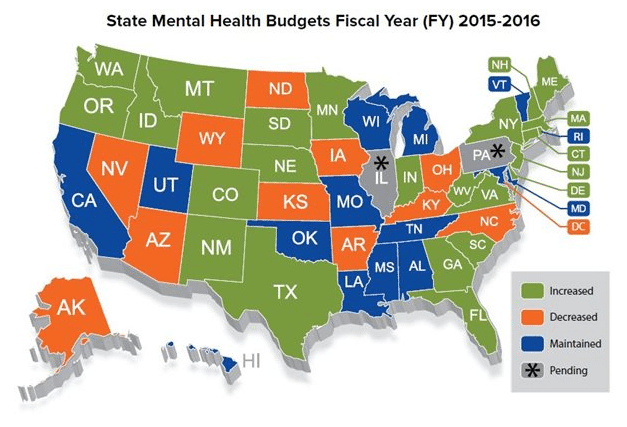STATE OF AFFAIRS: Only 23 States Increased Mental Health Spending in 2015
Congress Slow to Act on Nation’s Epidemic ARLINGTON, Va. – The National Alliance on Mental Illness (NAMI) released its annual survey of mental health care legislation this week, applauding Minnesota and Virginia as leaders in mental health reform. Disappointing was the fact that even after heroin overdose deaths have quadrupled in the United States in the past decade, many of which included those with dual diagnosis, only 23 states voted to increases spending on mental health this year. Minnesota, Virginia and New York stand out for investing significantly over the past 11 months to bolster their public mental health system. The report comes shortly before the third anniversary of the Newton school tragedy, which was the beginning of a public outcry for mental health reform. The conversation in politics today is about guns, and while that is an issue of vast importance, our nation is grossly neglecting access to the mental health and addiction treatment needed behind them. Yet, still, Washington, D.C. decreased funding this year, while Arizona, Minnesota, Utah, Virginia and Washington state passed the top 5 bills of the year increasing spending. Illinois and Pennsylvania still have not passed their overall budgets. “The good news is that efforts to improve the lives of people affected by mental illness have continued in 2015,” said NAMI Executive Director Mary Giliberti. “Some states have enacted specific reforms that can serve as models for others. And Congress has slowly begun to move forward now with mental health reform legislation. The bad news is that fewer states are strengthening investment in mental health care and Congress has only recently started to act after having been largely absent for two years. Increased focus by Congress will be needed to get final, comprehensive legislation.” We couldn’t agree more. Only 11 states (Colorado, Connecticut, Delaware, Idaho, Minnesota, New Hampshire, New Jersey, South Carolina, South Dakota, Virginia and Washington) increased investment in mental health care for three years straight, proving that more must be done on a federal level. Alaska, North Carolina and Wyoming cut mental health spending every year since 2013. After two years of increase, cuts were made this year in Arizona, Iowa, Kansas and Ohio. “Too much of the public dialogue about mental health over the past three years has been framed relative to violence,” said Giliberti. “The Newton tragedy and other events undeniably have helped to fuel public demand for mental health care reform. At the same time, studies clearly show that the vast majority of individuals living with mental illness are not violent. Tragedies are happening every day. They include people living with mental illness who end up in emergency rooms, jail or living homeless on the street. They include young people whose symptoms aren’t recognized early enough to avoid the worst outcomes. They include deaths by suicide.” 14 states received red flags in NAMI’s report, meaning the legislation was considered ill-informed or discriminatory. The report identified five top bills passed in 2015 as priority models for the rest of the country:
- Arizona’s House Bill 2488 – establishing a trust fund to provide housing for the seriously mentally ill
- Minnesota’s Senate Bill 1458 – developing effective intensive treatment methods for people who have experienced first-episode psychosis
- Utah’s House Bill 348 – reducing penalties for specified offenses involving controlled substances and providing that specified penalties be increased for subsequent convictions for the same offenses.
- Virginia’s House Bill 2118 – requires state facilities, community services boards, behavioral health authorities and private inpatient psychiatric service providers to update information included in the acute psychiatric bed registry whenever there is a change in bed availability for the facility, board, authority or provider or, if no change in bed availability has occurred, at least once daily.
- Washington state’s Senate Bill 5175 – recognizing telemedicine as a reimbursable service by which an individual receives medical services from a health care provider without in-person contact with the provider.
More strides:
- The presumptive eligibility (PE) process changed this year in Indiana. New provider types are now qualified to make determinations. This will help individuals who need immediate access to mental health and addiction services.
- In Colorado, under current law, a professional person may render mental health services to a minor who is at least 15 years old with the minor’s consent. The new law passed this year allows other licensed mental health professionals such as addiction counselors to render services to minors.
- West Virginia will now require the Secretary of Health and Human Resources to create an addiction treatment pilot program for offenders in the criminal justice system.
- New Jersey now requires the Division of Mental Health and Addiction Services to annually prepare a substance use treatment provider performance report and make it available to the public.
One thing is clear: Addiction and mental health is a bipartisan issue that affects all of us. It crosses every racial, economic, and gender boundary. And with only 23 states increasing funding for an issue that is increasing across the country, we need more voices. To contact your Congressman about legislation in your state, click on this link: http://www.contactingthecongress.org/ To read NAMI’s full report, click here: http://www.nami.org/statereport


